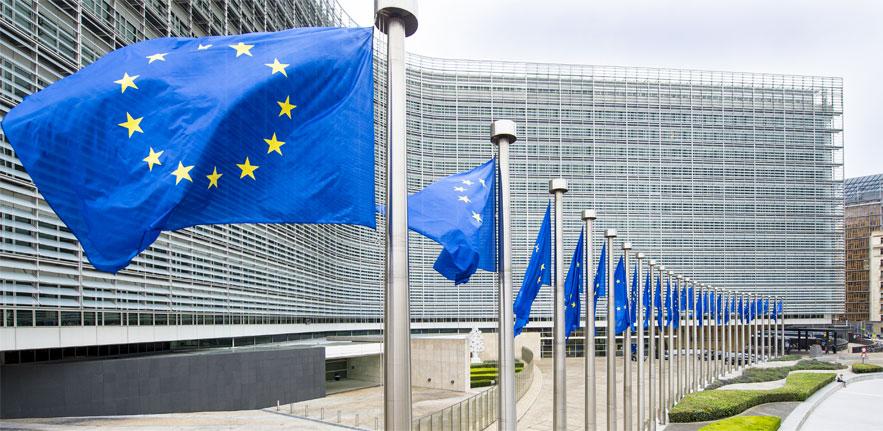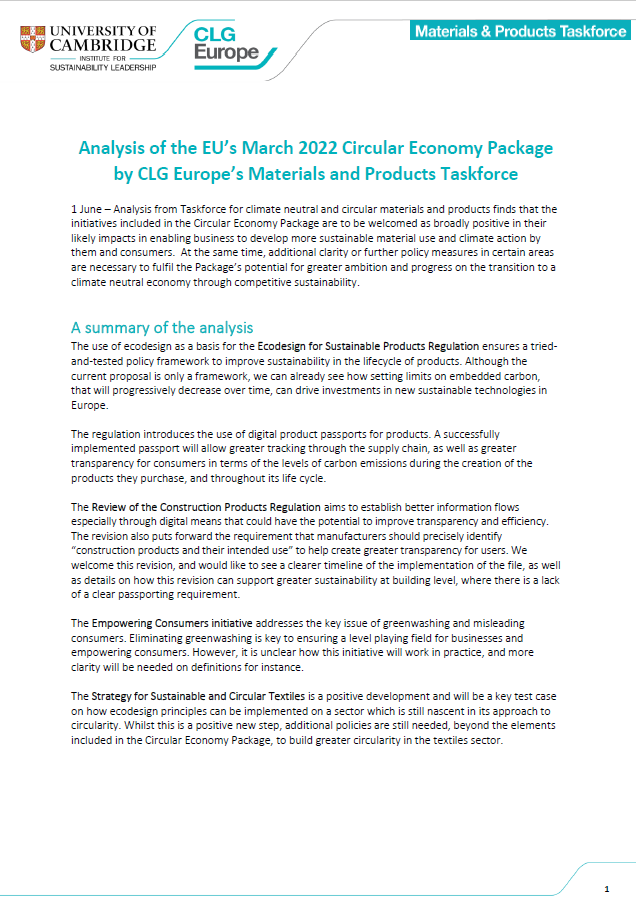
1 June 2022 - The European Commission recently released its March Circular Economy Package, a key moment for the transition towards a climate neutral and circular future. The package is composed of various proposals, including the long-awaited Ecodesign for Sustainable Products Regulation (ESPR), and seeks to accelerate the transformation towards a European circular economy.
Download the analysis here.
Our analysis finds that the initiatives included in the Circular Economy Package are to be welcomed as broadly positive in their likely impacts in enabling business to develop more sustainable material use and climate action by them and consumers. At the same time, additional clarity, or further policy measures in certain areas are necessary to fulfil the Package’s potential for greater ambition and progress on the transition to a climate neutral economy through competitive sustainability.
Key takeaways:
The use of ecodesign as a basis for the Ecodesign for Sustainable Products Regulation ensures a tried-and-tested policy framework to improve sustainability in the lifecycle of products. Although the current proposal is only a framework, we can already see how setting limits on embedded carbon, that will progressively decrease over time, can drive investments in new sustainable technologies in Europe.
The regulation introduces the use of digital product passports for products. A successfully implemented passport will allow greater tracking through the supply chain, as well as greater transparency for consumers in terms of the levels of carbon emissions during the creation of the products they purchase, and throughout its life cycle.
The Review of the Construction Products Regulation aims to establish better information flows especially through digital means that could have the potential to improve transparency and efficiency. The revision also puts forward the requirement that manufacturers should precisely identify “construction products and their intended use” to help create greater transparency for users. We welcome this revision, and would like to see a clearer timeline of the implementation of the file, as well as details on how this revision can support greater sustainability at building level, where there is a lack of a clear passporting requirement.
The Empowering Consumers initiative addresses the key issue of greenwashing and misleading consumers. Eliminating greenwashing is key to ensuring a level playing field for businesses and empowering consumers. However, it is unclear how this initiative will work in practice, and more clarity will be needed on definitions for instance.
The Strategy for Sustainable and Circular Textiles is a positive development and will be a key test case on how ecodesign principles can be implemented on a sector which is still nascent in its approach to circularity. Whilst this is a positive new step, additional policies are still needed, beyond the elements included in the Circular Economy Package, to build greater circularity in the textiles sector.
Martin Porter, Senior Strategic Adviser, Corporate Leaders Group Europe (CLG Europe) & Executive Chair, CISL Brussels said:
“The release of this Circular Economy Package is a significant moment. In the context of the war in Ukraine, it is critical that we enhance Europe's resilience and speed up our move towards a circular economy, reducing our geopolitical dependencies on Russia through greater self-sufficiency whilst also protecting our planet and building up our competitive sustainability. The long anticipated Ecodesign for Sustainable Products Regulation is a positive step forward, along with further pieces of legislation in construction, consumer rights and textiles. The legislation will set the foundation on which to build greater circularity in other key ecosystems in subsequent legislation. We will need to continue with an ambitious approach in order to deliver the European Green Deal, and to build coherence across wider EU industrial and climate initiatives to provide the certainty businesses need to innovate, invest and scale up their actions.”
Mirella Vitale, Senior Vice President of Marketing, Communications and Publics Affairs, Rockwool Group said:
“The European Commission’s Circular Economy Package is a solid start, though geopolitical realities coupled with the enduring climate crisis require much bolder policy. To achieve a truly circular economy, we need to take the interdependency among all circularity parameters into account. Durability is by far the most important and is critical to avoiding over-consumption and waste. Recycled content can mean many things in construction products and materials, so it cannot work as a single goal. Rather, we need to ensure that the increasing demands on recycled content do not compromise durability and recyclability in order to prevent the Renovation Wave from turning into a waste wave”.






